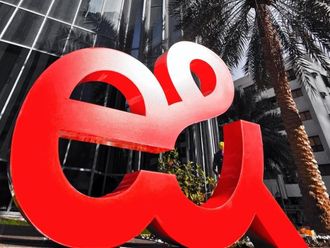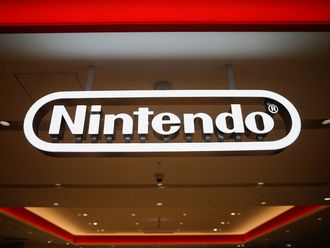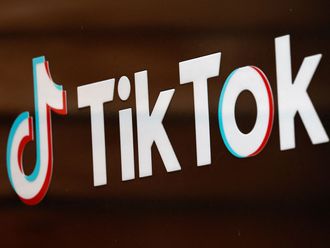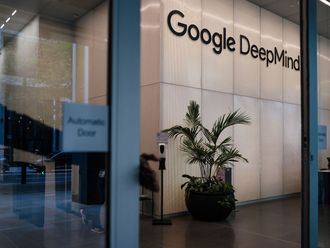San Francisco: Dell Inc, which has $6 billion (Dh132 billion) of debt due before 2016, is being treated like a junk-rated borrower as its cash falls to the lowest level in a decade with customers favouring tablets and smartphones over personal computers.
Credit-default swaps tied to the fourth-largest PC maker are trading at levels that imply Dell should be rated Ba1, or six levels below its current grade, according to Moody’s Corp’s capital markets research group. Moody’s Investors Service has Dell at A2, while Standard & Poor’s puts it one level lower at A-.
The contracts, which climb as confidence in a borrower’s creditworthiness dims, surged after Round Rock, Texas-based Dell forecast last week third-quarter revenue below analysts’ estimates and cut its full-year profit outlook. Attempts to transform by adding software, storage and networking equipment have been slow to offset falling sales of desktops and laptops, which make up about half of revenue. Customers increasingly prefer tablets such as Apple’s iPad to traditional machines.
“You have to figure out how you transition the model in a world where you’ve become commoditised,” Noel Hebert, chief investment officer at Bethlehem, Pennsylvania-based Concannon Wealth Management LLC, said in a telephone interview. “Dell’s saying service and maybe selectively software or selectively storage, but those are all rooms where people already live, so you have to figure out how to get into those rooms and take share.”
In line
David Frink, a spokesman for Dell, said the company’s bonds are a “more accurate market indicator,” which are “trading in line with indices at our rating.”
“Our second-quarter performance and growth of our enterprise solutions provided a proof point that our long-term strategy is making progress,” Frink said in an email.
Net cash fell to $3.45 billion last quarter, the least since 2002, according to data compiled by Bloomberg. That’s down from a high of $11.9 billion in the company’s third quarter of 2008 as Dell acquired makers of data storage, networking equipment and business software to diversify beyond PCs.
Credit-default swaps tied to the company’s debt have surged to 256 basis points through August 24, from this year’s low of 110 on March 21, according to prices compiled by Bloomberg. That means investors pay $256,000 annually on a contract protecting $10 million of debt for five years. The contracts reached 280 basis points on July 23, the most expensive since December 2008.
Shares tumble
The credit-default swaps, which pay the buyer face value if a borrower fails to meet its obligations, less the value of the defaulted debt, indicate the market sees Dell as a Ba1 credit, or one level below investment grade, Moody’s Corp data show.
Dell’s $400 million of 4.625 per cent notes due in April 2021 traded on August 22 at 110.7 cents on the dollar to yield 3.19 per cent, according to Trace, the bond-price reporting system of the Financial Industry Regulatory Authority.
Investors have boosted the computer maker’s cost of debt maturing in more than 10 years higher than average technology bonds rated BBB, Bloomberg data show. Dell’s bonds with a 15-year tenor yield 4.87 per cent, while BBB rated technology bonds average a 4.04 per cent yield.
Shares have fallen 23 per cent this year to $11.26 as of the end of last week and reached a more than three-year low of $11.24 on August 23.
Forecast reduction
As some businesses “deteriorated more than we expected,” and macroeconomic conditions worsened, damping consumer spending, the company cut its fiscal 2013 earnings forecast outlook to at least $1.70 a share, Chief Financial Officer Brian Gladden said in an August 21 earnings conference call. That’s 20 per cent lower than its projection in February, and shy of the average $1.90 estimate in a Bloomberg survey.
The company, started by Michael Dell, 47, in his dormitory room at the University of Texas, traditionally has focused on the PC business, which has helped make its founder the 56th wealthiest person on the Bloomberg Billionaires index with a net worth of $13.3 billion.
Dell agreed this year to acquire Quest Software Inc, a maker of programs to manage corporate computer systems, bought Wyse Technology Inc in May to gain desktop devices used by cloud-computing customers, and purchased software vendors including data-backup maker AppAssure and network-security company SonicWall Inc earlier this year.
Deploying cash
“The flurry of acquisitions has not pummelled the balance sheet,” Dave Novosel, an analyst at Chicago-based bond researcher Gimme Credit LLC, wrote in an August 23 note titled “Remember When PCs Were Sexy.” “While revenue growth is likely to remain sluggish at best, we do believe margins will begin to increase.”
The company has $15 billion in cash and investments and has averaged almost $4 billion of free cash flow over the past three years, he wrote. Dell’s profit margin climbed to 5.05 per cent from 4.4 per cent in the prior quarter, down from 5.68 per cent a year ago, Bloomberg data show.
Dell said in June it will initiate a quarterly dividend of 8 cents a share and will use acquisitions to add products for corporate customers and curb reliance on PCs.
The dividend “reinforces management’s confidence of generating substantial levels of free cash flow,” Stephen Sohn, a senior credit officer at Moody’s, said in a statement June 12. Dell will “maintain a disciplined approach to capital allocation, which includes modest-sized acquisitions to support its strategy of building higher margin data centre and enterprise solutions.”
Computer sales
PC sales stalled globally in the second quarter, a seventh straight period of anaemic growth, market researcher Gartner Inc said in July. Dell’s share of the global PC market slipped to 12 per cent in 2011 from almost 15 per cent in 2007, while Apple grew to 10.9 per cent from 5.8 per cent, Bloomberg Industries data show. Hewlett-Packard Co accounted for 17 per cent last year, while Lenovo Group Ltd and Acer Inc made up 12.5 and 8 per cent.
“Dell is in a tough period of transition in purchasing trends of its products and increased competition from Lenovo and Acer,” said Adrian Helfert, a Boulder, Colorado-based senior vice president at Smith Breeden Associates who helps oversee $6.4 billion. Weak consumer and commercial spending will reinforce “the challenging environment for Dell.”












